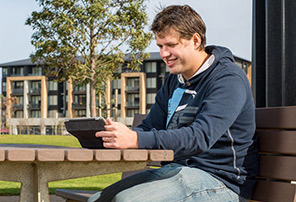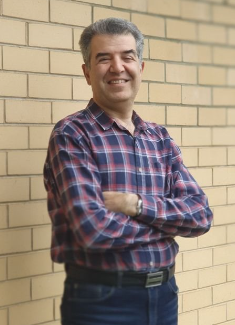You're viewing degree information for Australian students
You're an Australian student if you are any of the following:
- Australian or New Zealand citizen
- Australian Permanent Resident (including Permanent Humanitarian Visa holders)
Please remember your residency (the country you are currently in) has no impact on whether you are an Australian or International student.
Associate Degree in Engineering
Degree Level Undergraduate
Year 2025
-
View full entry requirements Hide full entry requirements
Entry requirements
Admission criteria
The admission criteria have been grouped to assist you to easily find the information most relevant to your circumstances. However, you may fit into more than one and the university will consider applicants against each of the relevant criteria.
Certain conditions apply. For more information refer to Appendix 4 of the University's Selection and Entry policy.
Prerequisite: Students should have achieved SACE Stage 1 passes, or an equivalent TAFE or other approved qualification in Mathematics.
Applicants are also required to meet one of the following criteria with competitive result:
Higher education study- successfully completed equivalent to a minimum of half a year of full-time study of a higher education program at a recognised higher education provider
OR
Vocational Education and Training (VET)- completed an award from a registered training organisation at Certificate IV level or above
OR
Work and life experience (domestic students only)- passed a UniSA Online literacy and numeracy test and have relevant work experience;
- completed a 12-month UniSA Foundation Studies program or equivalent; or
- qualified for Special Entry
OR
Recent secondary education
- completed a secondary education qualification equivalent to SACE, such as an interstate year 12 international qualification
Essential requirements for admission
Prerequisites
Refer to Entry RequirementsAssumed Knowledge
None
Degree overview
-
Study at one of Australia’s leading universities for Engineering research.1
-
Top 10 in Australia for teaching quality2 and graduate skills in engineering3.
-
Use your qualification as a pathway into a professional career in civil, mechanical, mechatronics, electrical engineering and/or surveying.
-
Graduate with credit towards an Undergraduate Engineering degree, such as the UniSA Bachelor of Engineering (Honours) degree.
-
Study course content that has been informed by the latest advancements in the field.
-
Learn introductory mathematics, physics and chemistry, along with core engineering courses.
1UniSA's Engineering research rated well above world-class – 2018 Excellence in Research for Australia (ERA).
2Ranked #9, ComparED (QILT) Student Experience Survey 2021-22, Teaching Quality Indicator (Postgraduate). Public universities.
3Ranked #8, ComparED (QILT) Student Experience Survey 2021-22, Skills Development Indicator (Postgraduate). Public universities.
Snapshot

Study On Demand – this is a 100% online engineering qualification designed specifically for online learning. With UniSA Online, you can take full control over your study, access support seven days a week, plan your study to fit around your life, view learning resources 24/7, and log into the interactive online environment anywhere, any time and on any device.
Graduate with the skills to transition from tradesperson to engineering professional with the knowledge and skills required in higher-level technical and management roles. Your qualification is also a great starting point if you’re looking to change careers and enter the engineering industry for the first time.
This two-year qualification is an introduction to university-level study and is a pathway towards UniSA’s Bachelor of Engineering degrees, which has specialisations in civil, mechanical, mechatronics, electrical engineering and/or surveying. Depending on the combination of courses you choose, you could be eligible for up to 1.5 years of credit towards an Engineering (Honours) Bachelor degree with UniSA. Alternatively, you may choose to go directly into employment as an engineering associate, designer drafter, developer or engineering technical officer across a range of industries.
What you'll learn

Study a broad range of subjects that cover essential maths, physics and chemistry topics, and first-year courses from UniSA’s engineering bachelor degrees. Be introduced to core concepts across civil, electrical and mechanical engineering disciplines. Graduate with a solid understanding of the relationship between each field and challenges that may arise when working on multidisciplinary projects.
Discover how engineering intersects with essential business management practices across diverse environments. Uncover market forces, business realities and ethical, legal and environmental factors that impact engineering projects. Study systems and design thinking techniques and learn how innovation and creativity are essential ingredients in generating new ideas and solutions.
Engineers apply science and maths concepts to solve practical problems. The maths insights and skills you gain throughout your studies will be an essential foundation to further your understanding of more complex engineering concepts. You’ll learn the basics in algebra, trigonometry and calculus.
Cover basic concepts in chemistry and physics and their practical application to engineering. Explore fluid mechanics and thermal energy, circuits and signals, and the structure and properties of materials. You’ll also learn to produce 2D engineering drawings and 3D engineering models, which is an essential skill to communicate visual designs.
Our practical approach to learning means you’ll gain the skills to hit the ground running. Throughout your studies, you’ll learn to use industry-standard software such as SolidWorks to produce 3D CAD models that bring your designs alive, Enovia (Dassault Systems) to develop detailed project plans, MATLAB to process data and Mulitsim to instantly visualise and analyse electronic circuit behaviour.
Why Associate Degree in Engineering

As one of Australia's leading universities for engineering research, your course content is informed by the latest advancements in the field.
Your qualification takes an industry-focused, project-based approach to learning. Be involved in projects developed by Engineers Without Borders, which supports real projects in developing countries around the world. Discover the ways in which engineering is fundamental to creating positive change and improves quality of life for disadvantaged communities.
With changing business models and digital innovations transforming the sector, an emerging skill set is in demand. While technical abilities are essential, employers are now seeking professionals who also possess effective communication and business management skills. Your associate degree will establish and hone your skills and help you stay ahead of the competition.
Your career
Engineering is a diverse and varied profession. Some engineers build the world’s cities, roads and bridges, some create components found in computers and gaming consoles while others help to develop renewable energy sources to protect the environment.
Your associate degree prepares you to work in jobs such as engineering associate, design drafter, developer or engineering technical officer. You’ll be well sought after in fields such as defence, construction, environmental engineering, mining and resources and civil infrastructure, depending on your area of interest.
This program is not accredited by Engineers Australia (EA) however graduates are eligible to apply for membership to EA at Engineering Associate level. Please contact EA for more information on the requirements and process for membership.
Careers to consider:
- Engineering associate: Work as a paraprofessional and design, develop and maintain products, equipment and processes; apply technical knowledge to complete routine engineering tasks such as performing calculations, operating machinery and preparing reports; and manage small projects under the supervision of a senior engineer.
- Design drafter: Support engineers to research and design new products and systems for an organisation; draft blueprints, model new components using 3D sketches; interpret engineering sketches, specifications and drawings; create test prototypes and oversee manufacturing processes; collaborate with design and production teams; and apply in-depth knowledge of the latest design trends and engineering software.
- Engineering technical officer: Support engineers to analyse and modify new and existing engineering technologies and apply them in the testing and implementation of engineering projects; monitor and test apparatus and operating equipment; conduct statistical studies to analyse production costs for a range of designs; and organise and direct site labour and the delivery of construction materials, plant and equipment.
- Engineering developer: Work with engineers to plan, design, develop, test and release new products and features, enhancements or fixes; assist with developing new methodologies and implement emerging technologies; write diagnostic programs and design and write code for operating systems; work on products such as mobile phones or car part construction; research designs using mathematical modelling using CAD and CAE software; and test prototypes and analyse results.
This associate degree is also a pathway into UniSA Engineering (Honours) degrees, allowing you to continue your studies and become a fully-qualified engineer and/or surveyor.
Thinking of studying soon?
Your study experience and support
Study On Demand
Our online career-focused degrees give you full control and ultimate flexibility over your study. It’s Study On Demand, on your schedule, on your terms.
- Study 100% online - no need to come onto campus
- Choose from four start dates in January, April, June and September
- Learn in 10-week blocks
- Get support seven days a week - including on weeknights
- Access learning resources 24/7
- View course content before your term starts
- Work while you study
- Plan your study schedule ahead of time
- Fast-track your studies and receive credit for past study and/or work experience.
IT Requirements
As a general rule of thumb, any desktop or laptop computer purchased in the past three years should be capable of meeting your online learning needs. While mobile devices such as tablets and smartphones will be able to access most of your online course content, there are likely to be elements of most courses where we recommend you use a desktop or laptop computer. Your computer should be able to:
- run a modern browser (Microsoft Edge, Firefox 24, Safari 5, or Chrome 32 or later versions)
- run Java
- run programs to create documents, spreadsheets and presentations
- use a web camera and headset (or ear pods with microphone)
- Some UniSA Online degrees require an online exam. The online exam software – Remote Proctor Now – has specific capability requirements. Please refer to the system requirements prior to conducting your exam to ensure your computer is compatible.
- Students will need a wired (USB cabled) tablet with a small, low-pressure sensitive pen that doesn’t have a battery. For improved efficiency, we also recommend the tablet has customisable buttons for quick access shortcuts.
Access free IT software and resources
As a UniSA Online student, you'll:
- Get free access to the full Office 365 ProPlus suite, which includes full versions of Word, PowerPoint, Excel, Outlook, OneNote, Publisher, Access and Lync software. Install the full suite on up to five different devices (PC and Mac compatible).
- Get 1Tb of personal storage that syncs with your PC or mobile device through OneDrive - it's like an extra hard drive that allows you to open any of your files from any of your devices, whenever you need them.
- Get free access to LinkedIn Learning - Access more than 5000 video courses on a broad range of topics such as: the Microsoft Office suite, time management and study skills, health and wellbeing, communication and presentation skills, photography, film making and designing your own games or mobile apps.
- Be able to connect with others using Microsoft Teams, Yammer and the Outlook Web App.
There are some degrees that have specialised software requirements. We've made this software available to students to access for free - you'll be able to download and install any of the required programs on your own device anywhere and anytime. See if your degree requires specialised software.
Check your device
Our computer system test will determine if your device has the base system resources and software required to study online. It'll also check the speed of your internet connection.
See if your computer, laptop or device is all set up and ready to go – it takes just a few seconds.
The application process is easy – just follow these simple steps:
-
Check your eligibility
Take our eligibility checker and answer a few short questions to see if you’re eligible. You’ll be given an option to continue your application, save it for later or request a call back from a Degree Adviser if you have any questions. -
Gather your relevant documents
If you're eligible, you'll receive an email outlining the entry requirements and the relevant documentation you need in order to be considered.
In order to verify your academic qualifications, you'll need to upload relevant documents like your official parchment, certificates or transcripts. If you have work experience, you will need to upload your CV as well as any other documents like work references, professional recognition or accreditation or your training certification.
Your email will contain information on the specific documents you need to provide as well as a link to log in to your application. You'll be asked to create an account and set your own password. -
Complete your application and send through your documents
In order to proceed with your conditional offer, you’ll need to complete your application and provide required evidence of your previous study or work experience.
Alternative Pathways
Australian
There are other pathways you can follow to study this degree, including:
- UniSA College Diploma in STEM (Engineering)
- UniSA College Undergraduate Certificate in University Studies (STEM)
- UniSA Online UniStart
Online Course Facilitator
-
When should I apply?
UniSA Online degrees start four times a year in January, April, June and September. There are key application dates for each term. If you're looking to apply for credit, there are different closing dates you need to be aware of, so it's always best to double check. Key dates can be found at unisaonline.edu.au/key-dates.
-
Do I have to be online at set times?
All of our courses are asynchronous, meaning you choose when to study, whenever it suits you. However, if your degree has online exams, you will need to sit these at a designated date and time. Some courses may also require you to speak to your academics via phone or online communication channels at a mutually agreed time as part of your assessment.
-
What academic support is available?
Our academics are available seven days a week, including weeknights. Throughout your degree, you’ll be supported by our highly experienced academic team of Online Course Facilitators and casual academics. Our teaching team will guide you through your learning and ensure you have an outstanding, high-quality education.
They can help you with your course materials and assessments, provide feedback on your work, assist you with referencing, and can answer any other course-specific queries.
You’ll be able to contact your academics via email, online discussion forums and live messages in the online learning environment. You can also communicate in real-time and chat face-to-face with your academics online.
If you need after-hours learning support, Studiosity is a great resource that can help you with your writing, academic language, grammar and referencing. You’ll also be able to chat online with a Studiosity online adviser.
-
How is my degree structured?
Full-time students study two courses each term. It makes earning a degree completely achievable, especially if you’re working. Your degree is delivered over four terms each year. Each term runs for ten weeks with two-week breaks in between each term.
You’ll also have the option to go part-time, or switch between the two. If you need to take a break in your study, that’s an option too. We recommend speaking to your Student Adviser who can help you update your study plan and check when your courses are offered.
-
What career prospects do I have with my university qualification?
Our degrees are designed in conjunction with industry experts, employers and professional associations, and informed by the latest developments in your field. You will graduate with in demand skills and up-to-date knowledge required by industry.
You will be studying with a university known for its employment outcomes. Your UniSA degree is more than just a piece of paper – it will prepare you to start your career, or take it to the next level. UniSA's online students have graduate employment rates well above the national average.*
UniSA Online qualifications follow the same Government Higher Education Standards Framework as our on-campus degrees. The parchment you receive at the end of your degree will be the same as any other University of South Australia student.
*UniSA External UG full-time employment rate 83% Graduate Outcomes Survey 2018
-
What are the main differences between online, on-campus and distance education?
The knowledge you gain from each mode of study is the same – it's how you get there that's different. When you study online, everything from your course material to weekly activities and assessments are fully online. You'll communicate with academic staff and students via live messages, online discussion forums and email.
Studying on campus requires students to physically come on to campus at specific times to attend lectures, tutorials and practicals. On-campus students have face-to-face contact with academics and fellow students and also communicate via email and online discussion boards.
Distance Education involves physical course material packages being sent to students, usually print based but occasionally audio or video. Communication is usually via telephone, mail and email. In today’s digital era, distance education has been superseded by online education.
More FAQs








